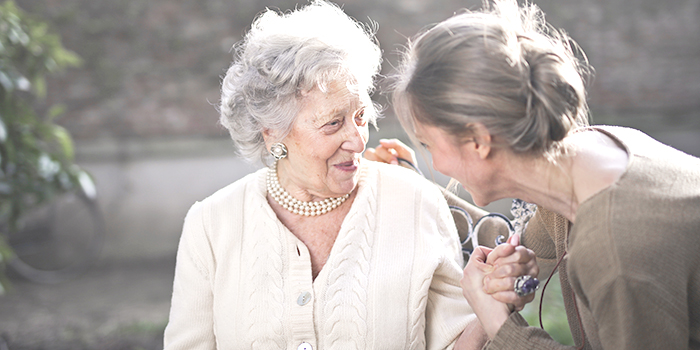Caregiver Challenges During the COVID-19 Pandemic
Caring for a loved one with health issues in “normal times” can be emotionally and physically taxing and stressful; add to that the concerns and circumstances of the COVID-19 pandemic and the danger of caregiver burnout mounts exponentially.
A helpful perspective can be found in information cited in a recent publication of www.mccleanhospital.org, an affiliate of Harvard Medical School, Navigating the Stresses of Caring for a Loved One During a Pandemic”,
The unprecedented circumstances are challenging for everyone, but they may be especially difficult for caregivers. Whether they are supporting older adults, children, or ill family members, caregivers can find their experience rewarding and joyful. They may also find it demanding and exhausting. The coronavirus pandemic adds another layer of stress to their lives.
Ipsit Vahia, MD, medical director of McLean’s Geriatric Psychiatry Outpatient Services, said it’s important to recognize that caregiving is an active process that requires a person’s full engagement—often physically and certainly mentally.
Vahia said, “Many people are now having to balance both caregiving and other professional commitments at the same time their usual support system is unavailable to them.”
Many of Vahia’s patients are in their late eighties or nineties and have children in their sixties who are their caregivers.
“These caregivers may struggle to balance,” Vahia said. “There’s the anxiety of caregiving for their loved one. But there’s also their own anxiety around falling into the high-risk category for catching COVID-19 themselves.” Vahia believes this group may be at the highest risk for caregiver burnout because they must deal with their own health anxiety as well as stress from their caregiver role.
Symptoms of caregiver burnout may include:
- Irritability
- Anxiety
- Tearfulness
- Lack of any emotion, apathy
- Sleeping too much or too little
- Fatigue even with enough sleep
- Physical aches and pains; stomach upset; headaches
- Lack of or increased appetite
- Inability to experience pleasure in things that used to bring pleasure
- Resentment towards person giving care to or other family members
- Feelings of guilt
- Lack of concentration or focus
Practicing self-care is even more important during this pandemic, as substitute caregiving options may be very limited. Caregivers are notorious for putting themselves last to get needs met. If you are one of those people, consider the following.
Seven tips to keep yourself mentally and physically healthy:
1. Maintain routine medical care, check-ups, vaccinations, etc.
Consult with your physician about symptoms that may be medically related such as physical aches and pains, stomach issues, sleep issues. Remember to take your medications as prescribed.
2. Establish regular contact with others.
Though social-distancing barriers may be in place, have regular phone, email, or video contact with a support system of friends, fellow caregivers, and family. Schedule a weekly or twice weekly contact, and don’t allow this to get lost in the business of your caregiving. It is vital for you to be able to talk freely about your concerns, stresses and frustrations with a trusted, understanding confidante.
3. Practice preventive physical and mental health routines.
Following the CDC guidelines for the pandemic, find ways to adapt your routine with the pandemic restrictions to exercise regularly, eat regularly and healthily, and practice meditation or relaxation exercises. YouTube is a source of a plethora of meditations and relaxation programs that can be easily utilized for the latter.
4. Avoid excessive use of alcohol or use of any recreational drugs.
Relying on these methods of relaxation and stress relief will likely create additional problems.
5. Seek respite help.
This can be challenging even in non-pandemic situations, but even more so now. It is very necessary to have a break to assist in reducing burn-out risk. There may be an individual who you know might help, who has not had high risk exposure to the virus. Home care agencies are still operating and may be able to provide a respite sitter for a few hours for a fee. Agencies such as Iowa Department on Aging at https://www.iowaaging.gov/about/area-agencies-aging or 800-532-3213 or Alzheimer’s Association at https://www.alz.org/iowa or 272.3900 (answered 24 hrs.) can assist with resources or referrals.
6. Make your well-being a priority.
You can’t help your loved one over the long-term if you are continually exhausted, depressed, or ill. Seek professional counseling if you are feeling at risk of harming yourself or your loved one. Call 911 if the situation is urgent. Go to your local emergency room if you able to get there safely. There is counseling available via telehealth using your smartphone or computer.
7. Seek help if you need help.
The National Alliance on Mental Illness (NAMI) has offered the following crisis resources as well. The National Suicide Prevention Lifeline connects you with a crisis center in the Lifeline network closest to your location. Your call will be answered by a trained crisis worker who will listen empathetically and without judgment. The crisis worker will work to ensure that you feel safe and help identify options and information about mental health services in your area. Your call is confidential and free. Or utilize the Crisis Text Line – Text NAMI to 741-741. You will connect with a trained crisis counselor to receive free, 24/7 crisis support via text message.
A simple but apt prayer for caregivers was shared in an article in Guideposts by author Olivia Abel posted April 2, 2020: Dear God, thank You for trusting me with the precious role of caring for another. Infuse me with Your strength when this crisis saps my energy; comfort me when I am lonely and fearful. Remind me that You are the Great Protector and that You are holding me and my family safely in your hands.
My presence will go with you, and I will give you rest. Exodus 33:14
Toni Larson, LISW
Director of Counseling – Perry Lutheran Homes & Lutheran Family Service
Is caregiving becoming too difficult for you to manage? Or, do you just need to take a period of time off to restore your own mental or physical health or well-being? Perry Lutheran Homes offers different levels of short-term, respite care stays for your loved one needing a little assistance or a lot of assistance. Reach out today by using our web form HERE.


 Follow Us On Facebook!
Follow Us On Facebook!
Comments are closed.